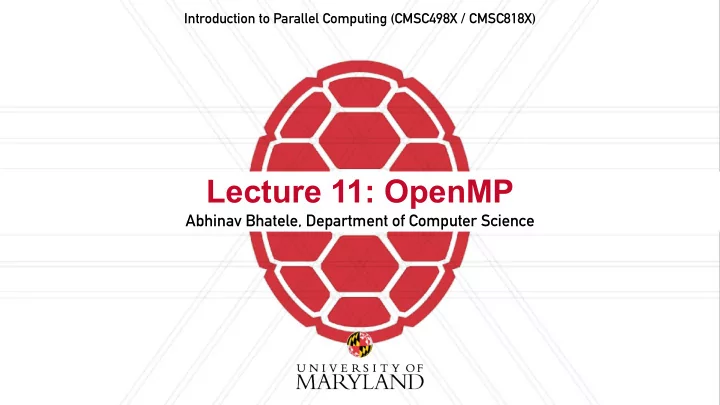

Introduction to Parallel Computing (CMSC498X / CMSC818X) Lecture 11: OpenMP Abhinav Bhatele, Department of Computer Science
Announcements • Assignment 2 has been posted • Deadline: October 19, 11:59 pm AoE Abhinav Bhatele (CMSC498X/CMSC818X) LIVE RECORDING 2
Shared memory programming • All entities (threads) have access to the entire address space • Threads “communicate” or exchange data by sharing variables • User has to manage data conflicts Abhinav Bhatele (CMSC498X/CMSC818X) LIVE RECORDING 3
OpenMP • OpenMP is an example of a shared memory programming model • Provides on-node parallelization • Meant for certain kinds of programs/computational kernels • That use arrays and loops • Hopefully easy to implement in parallel with small code changes Abhinav Bhatele (CMSC498X/CMSC818X) LIVE RECORDING 4
OpenMP • OpenMP is a language extension that enables parallelizing C/C++/Fortran code • Programmer uses compiler directives and library routines to indicate parallel regions in the code • Compiler converts code to multi-threaded code • Fork/join model of parallelism Abhinav Bhatele (CMSC498X/CMSC818X) LIVE RECORDING 5
Fork-join parallelism • Single flow of control • Master thread spawns worker threads https://en.wikipedia.org/wiki/OpenMP Abhinav Bhatele (CMSC498X/CMSC818X) LIVE RECORDING 6
Fork-join parallelism • Single flow of control • Master thread spawns worker threads https://en.wikipedia.org/wiki/OpenMP Abhinav Bhatele (CMSC498X/CMSC818X) LIVE RECORDING 6
Race conditions when threads interact • Unintended sharing of variables can lead to race conditions • Race condition: program outcome depends on the scheduling order of threads • How can we prevent data races? • Use synchronization • Change how data is stored Abhinav Bhatele (CMSC498X/CMSC818X) LIVE RECORDING 7
OpenMP pragmas • Pragma: a compiler directive in C or C++ • Mechanism to communicate with the compiler • Compiler may ignore pragmas #pragma omp construct [clause [clause] ... ] Abhinav Bhatele (CMSC498X/CMSC818X) LIVE RECORDING 8
Hello World in OpenMP #include <stdio.h> #include <omp.h> int main(void) { #pragma omp parallel printf("Hello, world.\n"); return 0; } • Compiling: gcc -fopenmp hello.c -o hello • Setting number of threads: export OMP_NUM_THREADS=2 Abhinav Bhatele (CMSC498X/CMSC818X) LIVE RECORDING 9
Parallel for • Directs the compiler that the immediately following for loop should be executed in parallel #pragma omp parallel for [clause [clause] ... ] for (i = init; test_expression; increment_expression) { ... do work ... } Abhinav Bhatele (CMSC498X/CMSC818X) LIVE RECORDING 10
Parallel for example int main(int argc, char **argv) { int a[100000]; #pragma omp parallel for for (int i = 0; i < 100000; i++) { a[i] = 2 * i; } return 0; } Abhinav Bhatele (CMSC498X/CMSC818X) LIVE RECORDING 11
Parallel for execution • Master thread creates worker threads • All threads divide iterations of the loop among themselves parallel for synchronize Master thread Worker thread 1 Worker thread 2 Worker thread 3 Time Abhinav Bhatele (CMSC498X/CMSC818X) LIVE RECORDING 12
Number of threads • Use environment variable export OMP_NUM_THREADS=X • Use omp_set_num_threads(int num_threads) • Set the number of OpenMP threads to be used in parallel regions • int omp_get_num_procs(void); • Returns the number of available processors • Can be used to decide the number of threads to create Abhinav Bhatele (CMSC498X/CMSC818X) LIVE RECORDING 13
Loop scheduling • Assignment of loop iterations to different worker threads • Default schedule tries to balance iterations among threads • User-specified schedules are also available Abhinav Bhatele (CMSC498X/CMSC818X) LIVE RECORDING 14
Data sharing defaults • Most variables are shared by default • Global variables are shared • Exception: loop index variables are private by default • Stack variables in function calls from parallel regions are also private to each thread (thread-private) Abhinav Bhatele (CMSC498X/CMSC818X) LIVE RECORDING 15
Abhinav Bhatele 5218 Brendan Iribe Center (IRB) / College Park, MD 20742 phone: 301.405.4507 / e-mail: bhatele@cs.umd.edu
Recommend
More recommend